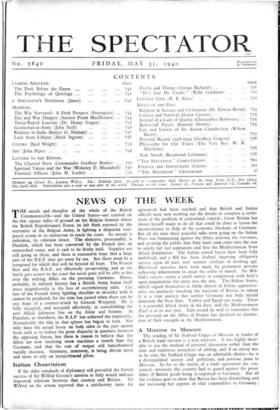NEWS OF THE WEEK
THE minds and thoughts of the whole of the British Commonwealth—and the United States—are centred on the few square miles of ground on the Belgian frontier where the British Expeditionary Force, its left flank exposed by the surrender of the Belgian Army, is fighting a desperate rear- guard action in its endeavour to reach the coast. Its morale is unbroken, its cohesion intact. The objective, presumably, is Dunkirk, which has been converted by the French into an entrenched camp, and is said to be firmly held. Supplies are still going in there, and there is reasonable hope that a large part of the B.E.F. may get away by sea. But there must be a rearguard for which that will be beyond all hope. The French fleet and the R.A.F. are effectively co-operating, and as the battle gets nearer to the coast the naval guns will be able to fire over the retiring Allies on the pursuing Germans. Never, probably, in military history has a British Army borne itself more magnificently in the face of overwhelming odds. The fate of the French Army fighting shoulder to shoulder with it cannot be predicted, for the time has passed when there can be any hope of a counter-attack by General Weygand. He is fully occupied, and occupied effectively, in consolidating the new Allied defensive line on the Aisne and Somme. In Flanders, as elsewhere, the R.A.F. has achieved the impossible. Numerically the tide in that sphere has begun to turn. Not only have the actual losses on both sides in the past month been such as to reduce the great disparity in numbers between the opposing forces, but there Is reason to believe that the Allies are now receiving more machines a month than the Germans, and that the rate of output will henceforward rapidly increase. Germany, moreover, is being driven more and more to rely on inexperienced pilots.






























